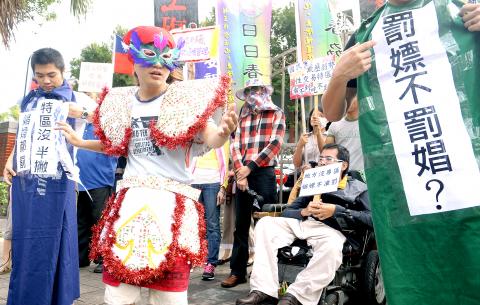The Collective of Sex Workers and Supporters (COSWAS) yesterday lashed out at both the Chinese Nationalist Party (KMT) and the Democratic Progressive Party (DPP), accusing them of reluctance to propose a real solution for sex workers as a clause in the Social Order Maintenance Act (社會秩序維護法) that penalizes sex workers is due to expire.
Declared unconstitutional by the Council of Grand Justices three years ago, a clause in the Social Order Maintenance Act that penalizes sex workers, but not their clients, will expire on Sunday.
The Cabinet has proposed amendments to the law to authorize local governments to create red-light districts where the sex trade is allowed, while it would remain banned outside those areas.

Photo: George Tsorng, Taipei Times
DPP Legislator Huang Sue-ying (黃淑英) also proposed amendments to penalize only the client, not the sex worker.
KMT Legislator Cheng Li-wun (鄭麗文) has also proposed her own law revision to totally decriminalize the sex trade. However, her proposal has not received much support from colleagues.
“The KMT said that it supports allowing the sex trade to a certain extent with appropriate management, and that’s why the Cabinet has proposed the ‘red-light district’ plan,” COSWAS executive director Chung Chun-chu (鍾君竺) told a press conference held in front of the Legislative Yuan.
“But there’s neither ‘allowing the trade to a certain extent’ nor ‘appropriate management’ in the Cabinet plan — which is supported by most KMT lawmakers — because no local government is willing to -designate red-light districts, and thus it’s a de facto complete ban on the sex trade,” Chung said.
Responding to Minister of the Interior Jiang Yi-huah’s (江宜樺) earlier remarks that the designation of red-light districts “could be discussed later after the law revision is passed,” Chung said: “Well, ‘discussing it later’ doesn’t mean anything for sex workers, because waiting for one more day means that they are not able to work and make a living for an extra day.”
Although DPP Chairperson Tsai Ing-wen (蔡英文) and the DPP caucus have criticized the Cabinet proposal, saying it would not work regardless of whether the law penalizes the prostitute or the client, or allows red-light districts, Chung said that the DPP has also failed to propose any concrete solutions.
“Both parties try to pretend that they’re open-minded and progressive, but what they do is different from what they say,” Chung said.
Although it supported complete decriminalization of the sex industry, Chung said that the COSWAS would be willing to compromise on the red-light district proposal “if a clause is added to the red-light -district deal that local governments should designate red-light districts within six months after the amendment is passed or the sex trade should remain completely legal within cities or counties where the local government fails to do so.”

A magnitude 4.9 earthquake struck off Tainan at 11:47am today, the Central Weather Administration (CWA) said. The hypocenter was 32.3km northeast of Tainan City Hall at a depth of 7.3km, CWA data showed. The intensity of the quake, which gauges the actual effect of a seismic event, measured 4 in Tainan and Chiayi County on Taiwan's seven-tier intensity scale, the data showed. The quake had an intensity of 3 in Chiayi City and County, and Yunlin County, while it was measured as 2 in Kaohsiung, Nantou County, Changhua County, Taitung County and offshore Penghu County, the data showed. There were no immediate reports of

‘DENIAL DEFENSE’: The US would increase its military presence with uncrewed ships, and submarines, while boosting defense in the Indo-Pacific, a Pete Hegseth memo said The US is reorienting its military strategy to focus primarily on deterring a potential Chinese invasion of Taiwan, a memo signed by US Secretary of Defense Pete Hegseth showed. The memo also called on Taiwan to increase its defense spending. The document, known as the “Interim National Defense Strategic Guidance,” was distributed this month and detailed the national defense plans of US President Donald Trump’s administration, an article in the Washington Post said on Saturday. It outlines how the US can prepare for a potential war with China and defend itself from threats in the “near abroad,” including Greenland and the Panama

The Chinese Nationalist Party (KMT) is maintaining close ties with Beijing, the Democratic Progressive Party (DPP) said yesterday, hours after a new round of Chinese military drills in the Taiwan Strait began. Political parties in a democracy have a responsibility to be loyal to the nation and defend its sovereignty, DPP spokesman Justin Wu (吳崢) told a news conference in Taipei. His comments came hours after Beijing announced via Chinese state media that the Chinese People’s Liberation Army’s Eastern Theater Command was holding large-scale drills simulating a multi-pronged attack on Taiwan. Contrary to the KMT’s claims that it is staunchly anti-communist, KMT Deputy

RESPONSE: The government would investigate incidents of Taiwanese entertainers in China promoting CCP propaganda online in contravention of the law, the source said Taiwanese entertainers living in China who are found to have contravened cross-strait regulations or collaborated with the Chinese Communist Party (CCP) could be subject to fines, a source said on Sunday. Several Taiwanese entertainers have posted on the social media platform Sina Weibo saying that Taiwan “must be returned” to China, and sharing news articles from Chinese state media. In response, the Mainland Affairs Council (MAC) has asked the Ministry of Culture to investigate whether the entertainers had contravened any laws, and asked for them to be questioned upon their return to Taiwan, an official familiar with the matter said. To curb repeated